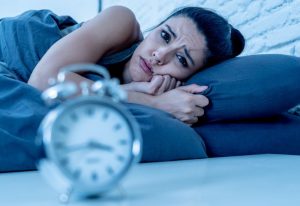Having occasional trouble sleeping is a fairly common issue. It can be stressful, especially for those who have to be up at a specific time for work or school. Unfortunately, the stress of not being able to sleep and the worry about not being able to get up on time or being too tired to be at your best the following day can make any sleep issue worse.
There are two types of techniques you can add to your better sleep arsenal: those that deal with the problem in the moment and those that help prevent sleep problems in the first place. Avoid that stress and worry while improving your sleep quality by learning what to do when you can’t sleep.
Immediate Action Tips for What to Do When You Can’t Sleep

First, forget the clock. In fact, turn it away from you. It only adds to your stress if you have to get up at a certain time and are struggling to fall asleep. That added stress and worry makes it even harder to fall asleep. Try to mentally let go of the need or desire to fall asleep right now so you can get up on time and do what you have to do. Don’t pressure yourself like that. Instead, make rest an acceptable outcome and sleep will likely follow. Focus on breathing, relaxation and peaceful visualization to reduce stress and move into the restful state that will allow sleep to come.
Try the 4-7-8 breathing method. Position your tongue behind your two front teeth, touching the roof of your mouth. If it helps, lightly purse your lips. Exhale through your mouth with a soft whoosh of air. Then close your mouth and inhale while counting slowly to four, allowing about one second per number. Hold that breath while counting seven seconds. Exhale slowly through the mouth with the light whoosh sound, taking eight seconds to empty the lungs. Run through this breathing cycle four times to help you feel relaxed and ready to sleep. Perhaps, if need be, follow it up with slow, deep, rhythmic breathing, focusing fully on the experience of breathing deeply and slowly as you drift into sleep.
Focus on relaxation. Working from the top down, starting with your face, consciously relax your muscles. As you feel the muscles of your face relax, move to your neck, then your shoulders, arms, hands and torso. Keep working your way down. Alternatively, you can tense your muscles for five to ten seconds, then relax them, moving gradually down the body. If you make it down to your feet without falling asleep, keep your body relaxed while you work on relaxing your mind by visualizing a peaceful, restful scene.
Engage your senses fully in this inner scene, focusing on what you see, hear, feel and smell. If you’re on an ocean beach, watch the waves, hear them lapping the shore, feel the warm sand and smell the scent of the salt water carried on the soft breeze. If you’re in the forest, hear the wind gently rustling the leaves above you, see the dappled sunlight, feel the coolness of the shade and smell the scent of the rich soil underneath last autumn’s undisturbed fallen leaves.
Improve Your Life Rhythm for Better Sleep
With a few lifestyle changes, you can train your mind and body to a rhythm that sets better sleep habits. Promote circadian rhythm health, important to your sleep-wake cycle, and utilize sleep hygiene techniques to give your daily life a rhythm. Set a schedule for sleeping, waking and eating. Stick to this schedule every day, including on days off. Increase your morning natural light exposure as it benefits your sleep-wake cycle via promoting a healthy circadian rhythm. Boost that benefit with some outside physical activity, as exercise during the day promotes better sleep at night.

Prepare to Sleep Well
Invest in good bedding and comfortable nightwear. Block outside light with shades or heavier bedroom curtains. Keep your bedroom cool. Don’t use your devices in your bedroom or, at least, not within two hours of bedtime. Establish a nighttime routine designed to manage stress, encourage relaxation and ease you into sleep. Try meditation or contemplating the good things of the day or things you are grateful for in your life. If working on establishing new sleep habits, consider using a melatonin supplement to ease the transition.







